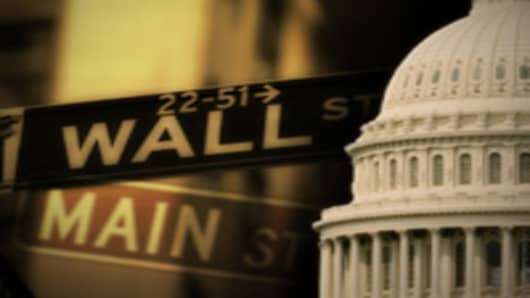Dallas Federal Reserve Bank President Richard Fisher said recently that the Fed had "done quite enough"in the supply of rescue and stimulus dollars.
He suggested that the failure of the policy response was due to the uncertainty created by legislators in Washington.
Policy uncertainty is a constant risk.
That so much has been enacted, and is in the process of being enacted, has many waiting on the sidelines trying to suss out the new landscape. In other words, the uncertainty created by the government's response to the crisis is at least partially responsible for the delays in recovery.
Ironic, huh?
Markets began to rally as Bank Stress Tests were proposed. An imploding banking system always comes down to the same thing: confidence.
Alexander Hamiltonwrote about the necessity of having the public's faith and confidence as essential to a successful banking system. Bank Stress tests were designed by the Federal Reserve, though they wouldn't share the findings at first. The Fed, after a reasonable period, declared the majority of major banks as sound, and investors and depositors alike accepted their word. Markets rallied. However, the banks have not been purged of their troubled assets. Rather, the increased accounting flexibility permitted by the government has perpetuated the lack of confidence in the banks' financial condition.
And bank management teams don't want to lend if they don't know how bad the losses on their legacy loans will get. Moreover, the unwillingness to lend is exacerbated by the uncertainty surrounding future capital requirements and other regulatory constraints. Is it any wonder why bank balance sheets are contracting with every passing quarter?
Interest rates are low and have been low thanks to a low Fed Funds rate and the Fed's quantitative easing. The Federal Reserve has even given up on tightening threats. The strongest statement we heard recently was that a certain Fed governor was growing less comfortable with the "extended period" language. Low interest rates have meant low mortgage rates, and low mortgage rates have offered support for home prices. But rates alone weren't enough: in the first quarter of 2010, the government funded 96.5% of all new mortgages in the US. Apart from mortgages, low interest rates keep payments on all types of consumer debt in check.
Higher debt service costs would add additional pressure to businesses and consumers and therefore curtail spending. Moreover, higher interest rates would lead to a surge in the federal government's debt service costs. Therefore, from this perspective, we have been fortunate that the European debt crisis has led to a "flight to quality" in Treasury bonds. However, the resulting low rates have effectively "reset" the economy to unsustainably low interest rates. We are concerned what happens when the music stops.




